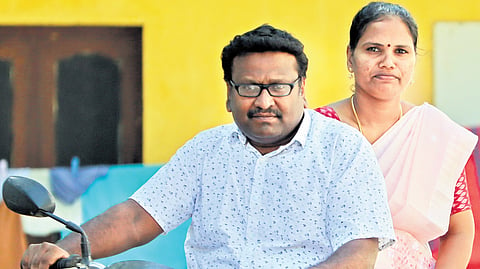Couple on a mission to ensure better healthcare for vulnerable communities in southern Tamil Nadu
TENKASI: In a dimly lit hallway of a government hospital in Madurai, where flickering lights cast a muted glow, a stretcher with bodies of three newborns was wheeled into the postmortem ward. C Anandaraj watched on, motionless, as the squeaky wheels of the stretcher broke the eerie silence. It was so heart-rending.
Anandaraj was visiting victims of caste violence at the Government Rajaji Hospital (GRH) when he came across the bodies of three babies.
The authorities told him that many critical cases from across Madurai and neighbouring districts are referred to GRH, but the hospital was short on incubators and ventilators back then.
"Lack of essential medical equipment led to infant deaths,” recalls the 41-year-old health rights activist.
On that gut-wrenching day at GRH in 2009, Anandaraj, who was working for a Dalit rights organisation then, decided to embark on a mission to bring about systemic change in the public health sector.
Since then, armed with meticulous research and countless Right To Information (RTI) applications, Anandaraj and his wife Veronica Mary (36) have filed over 120 Public Interest Litigations (PILs) in the Madurai Bench of the Madras High Court, demanding better healthcare facilities for vulnerable communities of southern districts.
“An RTI revealed that more than 700 infants die in GRH in a year. My subsequent PIL resulted in the hospital getting a Rs 150-crore Comprehensive Emergency Obstetric and Newborn Care (CEmONC) unit with state-of-the-art medical equipment,” says a proud Anandaraj.
Anandaraj and Mary, who have made a massive impact with endless nights of scanning through RTI responses, have recently exposed alarming statistics like the 1,448 deliveries of underage girls in 34 months in Tirunelveli district. Their PILs also led to announcement of fertility centres and emergency care units at the Institute of Obstetrics and Gynecology and Government Hospital for Women and Children in Chennai and Government Rajaji Hospital in Madurai.
Their crusade, especially Mary’s, has been a deeply personal one. During Covid-19 pandemic, Mary lost her mother. She collected evidence on suspected causes of her mother’s death and later approached the high court leading to the introduction of ‘zero delay admission system’ for Covid patients during the devastating second wave. Although Anandaraj and Mary’s legal battles have catalysed tangible improvements in healthcare infrastructure, this incident showed that their fight extends beyond courtroom victories.
Having faced a personal tragedy, Mary turned her grief into action and spearheaded efforts to ensure prompt admission of patients and advocated for life-saving surgeries like cochlear implants for children. The court battles also led to the availability of high-end PET CT Scan at GRH, MRI scanners in government headquarters hospitals, and setting up of a ceramic dental lab in medical college hospitals.
“GRH began performing cochlear implant surgeries on children after my PIL in 2016. Till last year, the hospital performed about 211 surgeries, each of which costs around `9 lakh in private hospitals,” says Anandaraj. The couple’s joint effort led to the introduction of organ transplantation facility in all medical college hospitals.
“Until 2016, apart from two Chennai-based medical college hospitals, mostly private hospitals were involved in harvesting organs of brain-dead patients. But we found some irregularities in assignment of organs and collection of money from beneficiaries. Hence, we scanned through hundreds of pages of RTI data about organ transplantation and filed a PIL in the high court demanding the introduction of organ transplantation facility in medical college hospitals. The court ordered its introduction within a year. As the state government failed to do so, we filed contempt proceedings. The government appealed against the court order in the Supreme Court. However, we received a favourable verdict. So far, more than 1,000 organs have been harvested and given to poor patients in medical college hospitals,” adds Veronica Mary.
In the last 15 years, they have helped over 3,000 patients in fight against medical negligence.
“In 2012, a Dalit woman died in Srivilliputhur government hospital, where she was admitted for delivery, allegedly due to non-availability of doctors. We gathered information about the doctors and the treatment given to her. Then we approached the high court and also registered a complaint with the police. The police registered an FIR against the hospital for medical negligence. The family of the deceased got `10 lakh in compensation. In another incident, we ensured `5 lakh in compensation for a child who fell ill after consuming acid in an anganwadi centre thinking it was a cold drink,” the activists say.
Recalling another incident in Thanjavur Medical College Hospital (TMCH), where a nurse accidentally cut off a portion of a thumb of a newborn while removing a cannula from its hand, Anandaraj said they ensured that the family got interim compensation of Rs 75,000. There are many other such cases where patients were duly compensated following Anandaraj and Mary’s intervention. As part of their crusade, the activist couple travels the length and breadth of remote villages across southern districts on a two-wheeler, raising awareness about health schemes and helping the needy.
So what drives their activism?
“I spent most of my teenage years with my bedridden father in private hospitals of Bangalore. I wondered why people, including my parents, preferred private hospitals while our governments are spending thousands of crores to develop health infrastructure. The fear about treatment quality in government hospitals is a factor. However, it is our duty to make these hospitals people-friendly and accountable for their actions. We are four in our family and have never approached a private hospital for any treatment,” explains Anandaraj. In 2017, Anandaraj received APR Rotary Impact Award and in 2022, Mary was presented with ‘human rights defender’ award by Action Aid Association for their visible role in protecting and promoting the rights of vulnerable communities.
(Edited by Adarsh TR)

